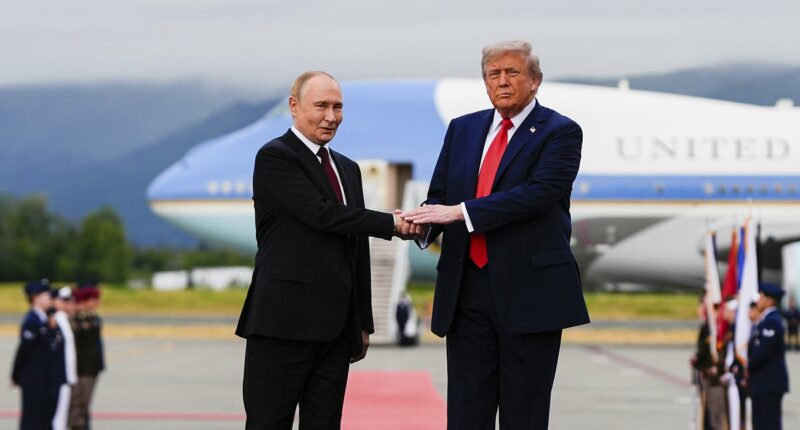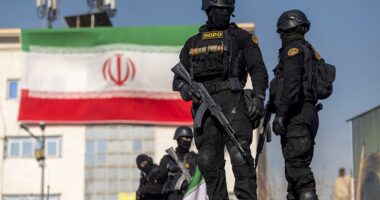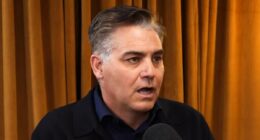Share this @internewscast.com

After a significant diplomatic victory in the Middle East, President Donald Trump is experiencing a wave of positive momentum, even garnering support from some previous skeptics. According to insiders at the White House, the president is in high spirits but remains cautious due to his complex relationship with a formidable adversary. A source knowledgeable about Trump’s recent discussions with Ukrainian President Volodymyr Zelenskyy described him as being in an “ambitious mood,” although fully aware of the challenges posed by Russian President Vladimir Putin.

“The president feels he has the upper hand to address the situation, yet he is very frustrated with Putin, believing that Putin’s actions are undermining his international image,” the source explained. This frustration has made Trump more skeptical and prepared to adopt tougher strategies if required. During a “productive” phone conversation on Thursday, Trump and Putin agreed to initiate new peace talks in Hungary in the upcoming weeks, though no specific date has been set.

The upcoming discussions carry immense significance. Experts have noted that while the recent ceasefire between Israel and Gaza and the associated prisoner exchange was challenging, dealing with Putin’s unpredictable nature presents an even greater challenge. Vladimir Putin, who commands a significant nuclear arsenal and controls much of Europe’s energy supply, has shown no willingness to retreat after nearly four years of ongoing conflict in Ukraine. “Putin is like a mob boss, whereas Hamas are merely street thugs,” remarked Len Khodorkovsky, a former deputy assistant secretary of state, highlighting the complex dynamics at play.

‘Putin is a master manipulator… former KGB,’ said a former senior defense official in the Biden administration. ‘He’s made it clear he wants to continue the war.’ Since their frosty Oval Office clash in February, when Trump and Vice President JD Vance openly criticized Zelenskyy for what they called a ‘lack of gratitude,’ the dynamic between the American president and his Ukrainian counterpart has thawed. Trump has moved from a hands–off approach with Putin to a tougher stance, even declaring that Ukraine could reclaim land taken by Russia. In a September Truth Social post, he labeled Russia a ‘paper tiger’ and, for the first time, called it the aggressor in the war.

President Trump is set to host Ukrainian President Volodymyr Zelenskyy at the White House on Friday, marking a clear shift toward strengthening US–Ukraine relations following months of pressure on Kyiv to make compromises in its conflict with Russia. A recent phone call between the two leaders reportedly included discussions about the potential transfer of long–range Tomahawk missiles to Kyiv, a topic expected to be revisited during their meeting. According to the former senior Biden Defense Department official, Trump’s recent strong posture in Gaza means his high-pressure tactics are now taken very seriously.

‘Trump was able to strong–arm Netanyahu,’ the official said, pointing to his influence in the recent Gaza ceasefire negotiations. With Iran—the main funder of Hamas—’basically eliminated’ following the 12–day war, the official said, ‘that gave Trump the ability to go back to Netanyahu and basically say, enough is enough.’ The Senior Biden administration official warned that Ukraine presents a very different kind of challenge, even though Trump said this week it’s a war Putin should’ve won in a week.

‘There’s no one capability that’s going to change the battlefield dynamics,’ the official said, noting that even advanced systems like Tomahawk missiles won’t present a silver bullet. ‘The way the war ends is at the negotiating table.’ Russia has an enormous army and vast battlefield resources. But its technology is generally thought to be far inferior to the western weapons that have flooded into Ukraine courtesy of the United States. John Sitilides, National Security Senior Fellow at the Foreign Policy Research Institute, observed that Russia is advancing its military campaign at a striking pace, in contrast to Hamas, whose military capabilities have dwindled—particularly as its primary backer, Iran, has been significantly weakened.

‘Russia continues to produce artillery shells and advanced drones at an astonishing rate, far surpassing the output of Ukraine or even NATO.’ Sitilides, a former State Department consultant, says Trump’s Middle East success has left Putin more isolated diplomatically. Putin relied on ties with now–weakened Iran and Syria and alienated Israel by aligning with pro–Palestinian forces. ‘Almost all of his Middle East partners are on the wrong side of the historic peace agreement,’ Sitilides said.

He cautioned that Putin is unlikely to engage in real peace talks unless major concessions are made, such as conceding Crimea, eastern Ukrainian territories, and Ukraine’s NATO exclusion. Meanwhile, a former Biden defense official noted the window for peace may be closing for both sides, as the Biden administration had prioritized maximizing Ukraine’s leverage before talks.

Still, the source argued the White House can take a key lesson from Trump’s recent Middle East breakthrough: ‘Friends and allies matter… When the whole region turns against you, that’s incredibly powerful,’ they said. ‘Standing shoulder to shoulder with more people is an incredible message to an aggressor.’








